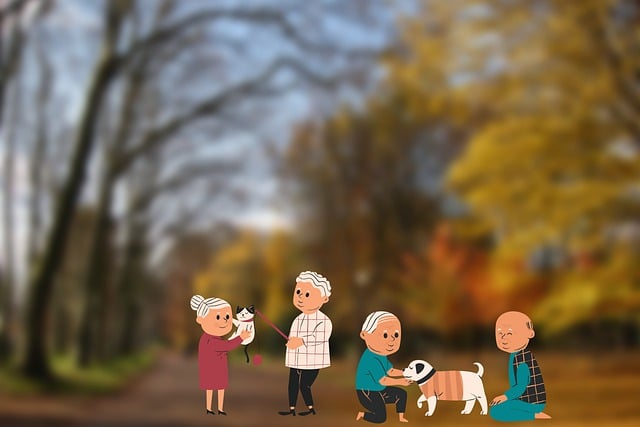In Oregon, grandparental rights are legally protected under specific frameworks to maintain meaningful relationships between grandparents and grandchildren. Grandparents can access various forms of legal protection, including visitation and access statutes, to safeguard their rights when threatened. Understanding the state's family law code, seeking specialized legal support, and gathering comprehensive documentation are crucial steps for navigating these protections. Oregon offers robust legal resources and advocacy groups to help grandparents protect their relationships and rights, ensuring fair outcomes in accordance with the best interests of both families.
Protecting grandparental rights in Oregon is a critical aspect of family law that ensures the well-being and continued involvement of grandparents in their grandchildren’s lives. This comprehensive guide delves into the intricate legal framework governing grandparental rights in Oregon. We explore who qualifies, outline practical steps to safeguard these rights, discuss available legal protections and support, and emphasize the pivotal role of legal advocacy in such cases. By understanding these aspects, families can navigate the process effectively, ensuring a robust legal foundation for grandparental rights in Oregon.
- Understanding Grandparental Rights in Oregon: A Legal Framework
- Who is Entitled to Grandparental Rights?
- Navigating the Process: Steps to Protect Grandparent's Rights
- Legal Protections and Support Available in Oregon
- The Role of Legal Advocacy in Grandparental Rights Cases
Understanding Grandparental Rights in Oregon: A Legal Framework

In Oregon, grandparental rights are legally protected, ensuring a meaningful relationship between grandparents and their grandchildren. Understanding this framework is crucial for navigating the complexities of family law. The state recognizes that grandparents play a vital role in a child’s life, providing love, support, and guidance. As such, Oregon laws offer various forms of legal protection to safeguard these rights.
Grandparental rights in Oregon are governed by specific statutes, primarily focusing on visitation and access. These laws allow grandparents to seek legal advocacy and support when their relationships with grandchildren are threatened. By understanding their legal standing, grandparents can actively protect their rights and ensure they remain an integral part of their grandchildren’s lives. Navigating grandparental rights protection involves familiarizing oneself with Oregon’s family law code, which provides a framework for resolving disputes and ensuring the best interests of both families are considered.
Who is Entitled to Grandparental Rights?

In Oregon, grandparental rights are recognized and protected under specific legal frameworks, ensuring that grandparents have a legitimate claim to maintain a relationship with their grandchildren. The right to seek custody or visitation is typically reserved for biological or adoptive parents, but grandparents can also establish a legal basis for involvement in their grandchildren’s lives. Understanding who is entitled to these rights is crucial when navigating the protective measures available.
Grandparental rights are usually triggered by circumstances where a grandchild’s parent (or parents) are no longer capable or willing to provide care, and the grandparent steps in to assume a significant role in the child’s upbringing. This could involve situations like parental death, divorce, or substance abuse issues. In such cases, Oregon law provides legal support and advocacy for grandparents seeking to protect their rights, ensuring that they can continue to play an active and loving role in their grandchildren’s lives.
Navigating the Process: Steps to Protect Grandparent's Rights

Navigating the process to protect grandparental rights in Oregon involves several crucial steps. First, it’s essential to understand the legal framework surrounding these rights, as outlined in Oregon Revised Statutes. This includes knowing when and how to file a petition for visitation or custody, which can be complex and varies based on individual circumstances. Seeking legal support from an experienced family law attorney who specializes in grandparental rights is a vital step. They can provide guidance tailored to your situation, ensuring all necessary documents are filed accurately and timely.
Additionally, gathering comprehensive documentation supporting your case is essential. This may include proof of the grandchild-grandparent relationship, evidence of a change in circumstances that warrants legal intervention, and any relevant medical or educational records. With solid legal advocacy, grandparents can effectively navigate these protections, ensuring their rights are upheld while fostering a healthy relationship with their grandchildren.
Legal Protections and Support Available in Oregon

In Oregon, protecting grandparental rights is a critical aspect of family law. The state offers robust legal protections and support systems for grandparents seeking to maintain their relationships with their grandchildren. Grandparents in Oregon have the right to petition for visitation or custody if they can demonstrate that it’s in the best interest of the child. Legal advocacy groups and non-profit organizations provide essential resources, guidance, and representation to help navigate the complex legal landscape surrounding grandparental rights.
Understanding these rights is crucial. The Oregon courts recognize the significant role grandparents often play in a child’s life and strive to uphold relationships when possible. There are specific laws in place that ensure fair and just outcomes for all parties involved. Grandparents can access legal support through various channels, including pro bono services, community legal clinics, and private attorneys specializing in family law. This network of assistance ensures that grandparents have the tools necessary to protect their rights effectively.
The Role of Legal Advocacy in Grandparental Rights Cases

In Oregon, protecting grandparental rights often involves a complex legal landscape that requires skilled advocacy. Legal advocacy plays a crucial role in ensuring grandparents’ rights are recognized and upheld, especially when facing challenges related to custody, visitation, or access to their grandchildren. The process of navigating these cases can be labyrinthine, with various laws and regulations governing family relationships. Grandparents seeking legal protection must understand the specific Oregon laws that safeguard their rights and ensure they have the necessary support to navigate this intricate system.
Oregon offers legal resources and organizations dedicated to assisting grandparents in exercising their rights. These include legal aid societies, advocacy groups, and pro bono services designed to provide guidance and representation. Understanding one’s rights and knowing when to seek professional help is essential in grandparental rights cases. Legal advocates can assist in interpreting laws, presenting a strong case, and representing grandparents’ interests in court proceedings, ultimately fostering a more favorable environment for positive outcomes.






